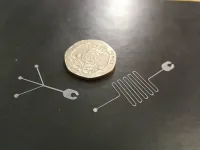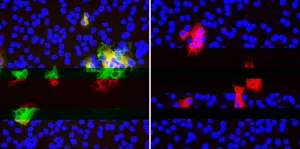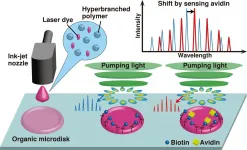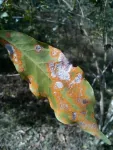(Press-News.org) DALLAS - Feb. 3, 2021 - Inactivating a gene in young songbirds that's closely linked with autism spectrum disorder (ASD) prevents the birds from forming memories necessary to accurately reproduce their fathers' songs, a new study led by UT Southwestern shows.
The findings, published online today in Science Advances, may help explain the deficits in speech and language that often accompany ASD and could eventually lead to new treatments specifically targeting this aspect of the disorder.
Study leader Todd Roberts, Ph.D., associate professor of neuroscience and a member of the Peter O'Donnell Jr. Brain Institute at UT Southwestern, explains that the vocalizations that comprise a central part of human communication are relatively unique among the animal world - not just for their complexity, but in the way they're passed down from caregivers to offspring. Songbirds such as zebra finches also learn complex vocalizations from caregivers (songs are passed on to male offspring typically from their fathers). Much like humans, these animals have intricate brain circuitry devoted to this task, found in a region of the brain in the birds often referred to as the high vocal center, or HVC.
Because of the parallels between language learning in humans and song learning in the birds, Roberts says, songbirds are often used as a scientific model for understanding speech development in people, including conditions in which vocal communication is changed.
In their research, Roberts and his colleagues used zebra finches to study the role of a gene called FoxP1, one of the genes most correlated with ASD. Mutations of this gene cause a specific subtype of autism linked with severe language impairment and intellectual disability.
Roberts, a Thomas O. Hicks Scholar in Medical Research, explains that learning vocalizations for both songbirds and humans consists of two different stages: First, birds and humans must form a memory of sounds. Next, they practice the sounds through imitation. Juvenile zebra finches typically practice their fathers' song thousands of times a day over three months, rehearsing it around 100,000 times until it's a close match. These birds can memorize the song 20 to 60 days after hatching, but they don't start to practice singing it until approximately 35 to 40 days after hatching.
To better understand the role FoxP1 might play in both parts of this process, the researchers separated young zebra finches into two groups: Half the birds spent their early lives in contact with their singing fathers and continued to live with them while they practiced their songs; the other half spent their early lives with their songless mothers and later joined their fathers during the practice phase. Either before the birds formed memories of the songs or before they began practicing, Roberts and his colleagues used a technique called RNA interference to "knock down" FoxP1 in the birds' HVC, ridding cells in this brain region of the vast majority of this gene's protein products. This technique used constructs created in the lab of Roberts' close collaborator and study co-author Genevieve Konopka, Ph.D., associate professor of neuroscience at UT Southwestern.
When the researchers analyzed the birds' songs in adulthood, they found that only those with active FoxP1 during the song memorization phase were able to accurately reproduce their fathers' songs. If this gene was knocked down during the practice phase, these birds could still correctly mimic the songs. However, birds in which FoxP1 was inactivated before memorization sang haphazard songs that bore no resemblance to the ones their fathers sang.
"Our results suggest that FoxP1 is key for forming the song memories in these birds that are critical for imitation later in life," Roberts says. "A similar deficit in humans could play a parallel role in speech development, blocking babies from forming memories of adult speech they hear around them and hindering their own communication as they grow."
If this finding is reinforced in future studies, he adds, it could lead to new types of therapy for children with autism. Current ASD therapies centered on speech development often focus on helping children learn the motor skills necessary to produce sounds. However, Roberts says, techniques that focus on helping children form speech memories may be more important. In the future, he says, it may be possible to avoid speech deficits by replacing the missing FoxP1 protein using gene editing or altering FoxP1-regulated signaling using pharmaceuticals.
"This study is not only critical for understanding the symptoms of patients with FoxP1-related ASD but also lays the groundwork for studying many other genes associated with ASD using the songbird system," adds Konopka, a Jon Heighten Scholar in Autism Research.
INFORMATION:
Other UT Southwestern researchers who contributed to this study include Francisco Garcia-Oscos, Therese Koch, Harshida Pancholi, Massimo Trusel, Vamsi Daliparthi, Fatma Ayhan, Marissa Co, Danyal H. Alam, and Jennifer E. Holdway.
This research was supported by grants from the National Institutes of Health (R21DC016340, R01NS108424, R01DC014364, and R01MH102603) and the National Science Foundation (IOS-1457206).
About UT Southwestern Medical Center
UT Southwestern, one of the premier academic medical centers in the nation, integrates pioneering biomedical research with exceptional clinical care and education. The institution's faculty has received six Nobel Prizes, and includes 23 members of the National Academy of Sciences, 17 members of the National Academy of Medicine, and 13 Howard Hughes Medical Institute Investigators. The full-time faculty of more than 2,500 is responsible for groundbreaking medical advances and is committed to translating science-driven research quickly to new clinical treatments. UT Southwestern physicians provide care in about 80 specialties to more than 105,000 hospitalized patients, nearly 370,000 emergency room cases, and oversee approximately 3 million outpatient visits a year.
A novel artificial intelligence (AI) approach based on wireless signals could help to reveal our inner emotions, according to new research from Queen Mary University of London.
The study, published in the journal PLOS ONE, demonstrates the use of radio waves to measure heartrate and breathing signals and predict how someone is feeling even in the absence of any other visual cues, such as facial expressions.
Participants were initially asked to watch a video selected by researchers for its ability to evoke one of four basic emotion types; anger, sadness, joy and pleasure. ...
(Boston)-- While a number of topical products designed to reduce the occurrence of sexually transmitted infections have been tested with largely disappointing results, researchers at Boston University School of Medicine (BUSM), Alpert Medical School of Brown University and Mapp Biopharmaceutical have now found that MB66, a vaginal film product containing monoclonal antibodies against human immunodeficiency virus-type 1 (HIV-1) and herpes simplex viruses types 1 and 2 (HSV-1 and 2), is safe and effective.
HIV-1 and HSV-1 and 2 are relatively common sexually transmitted infections associated with significant illness and sometimes even death. Though antiviral drugs can suppress viral concentrations and dramatically slow ...
Humans continuously observe and evaluate interactions between third parties to decide with whom to interact in the future. But it is difficult to measure what information animals gain when they eavesdrop on vocal interactions between conspecifics: If they do understand such conversations, they do not necessarily exhibit behavioral expressions that can be easily observed. To overcome this hurdle, anthropologists from the University of Zurich created a study combining call simulations, thermography methods and behavioral preference measures.
Using thermal imaging, the researchers were able to non-invasively measure temperature changes in the faces of marmoset monkeys to quantify ...
Narrowing of the trachea or the main bronchi due to injury or illness can end very badly. If patients get too little air,oxygen, they risk suffocating and often need medical help as quickly as possible.
Surgeons insert stents made of medically usable silicone or metal as a way of treating these patients. Although they quickly bring relief, the implants also have disadvantages: Metal stents have to be removed surgically with some effort, which is a burden for the patients, while silicone stents often migrate away from the insertion site. The reason for this is that the implants are not adapted to a patient's anatomy.
An ETH Zurich research team, composed of members of the Complex Materials and Drug Formulation and Delivery groups, has now developed an ...
New technology developed by the University of Bristol has the potential to accelerate uptake and development of on-chip diagnostic techniques in parts of the world where rapid diagnoses are desperately needed to improve public health, mortality and morbidity.
Microfluidic devices underpin lab-on-a-chip (LOC) technologies which are developed to provide the rapid diagnoses at that are needed at point of care (POC) for the swift and effective treatment of many diseases.
Researchers at Bristol have developed a fast, reliable and cost-effective alternative for producing the soft-lithographic moulds used for fabricating microfluidic devices, published in the journal ...
PITTSBURGH, Feb. 3, 2020 - In a recurring pattern of evolution, SARS-CoV-2 evades immune responses by selectively deleting small bits of its genetic sequence, according to new research from the University of Pittsburgh School of Medicine.
Since these deletions happen in a part of the sequence that encodes for the shape of the spike protein, the formerly neutralizing antibody can't grab hold of the virus, the researchers report today in Science. And because the molecular "proofreader" that usually catches errors during SARS-CoV-2 replication is "blind" to fixing deletions, they become cemented into the variant's genetic material.
"You can't ...
Researchers have identified a pattern of deletions in the spike (S) glycoprotein of SARS-CoV-2 that can prevent antibody binding. Virus lineages featuring this mechanism are currently being transmitted between individuals globally, they say. Their results - reported after analyzing nearly 150,000 S gene sequences collected from many parts of the world - exhibit a form of virus "escape" that resulted from a common, strong selective pressure; for example, the authors identified at least nine instances where deletion variants arose in patients whose COVID-19 infections were persistent. So far, the strongest indicator of protection against SARS-CoV-2 appears to be humoral immunity, such as by antibodies, ...
WASHINGTON -- Researchers have developed a unique inkjet printing method for fabricating tiny biocompatible polymer microdisk lasers for biosensing applications. The approach enables production of both the laser and sensor in a room temperature, open-air environment, potentially enabling new uses of biosensing technologies for health monitoring and disease diagnostics.
"The ability to use an inexpensive and portable commercial inkjet printer to fabricate a sensor in an ambient environment could make it possible to produce biosensors on-site as needed," said research team leader Hiroaki Yoshioka from Kyushu University in Japan. "This could help make biosensing widespread even in economically disadvantaged ...
Coffee rust is a parasitic fungus and a big problem for coffee growers around the world. A study in the birthplace of coffee - Ethiopia - shows that another fungus seems to have the capacity to supress the rust outbreaks in this landscape.
"Coffee leaf rust is a fungal disease that is a problem for coffee growers around the world, especially on Arabica coffee, which accounts for three quarters of global coffee production and has the finest cup quality. There is a need to learn more about natural solutions instead of just applying pesticides," says Kristoffer Hylander, professor at the Department of Ecology, Environment and Plant Sciences (DEEP) at Stockholm ...
Many nations place drugs into various schedules or categories according to their risk of being abused and their medical value. At times, drugs are rescheduled to a more restrictive category to reduce misuse by constricting supply. A new study examined lessons from past efforts worldwide to schedule and reschedule drugs to identify general patterns and found that rescheduling drugs can lower use as well as the dangers associated with the drug. The findings have implications for policy.
The study, by researchers at Carnegie Mellon University (CMU), is published in the International Journal of Drug Policy.
"Our review suggests that rescheduling drugs can often disrupt trends in prescribing, use, or harms," says Jonathan Caulkins, professor of operations research and public policy at CMU's ...





